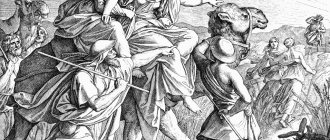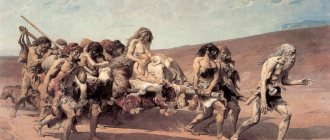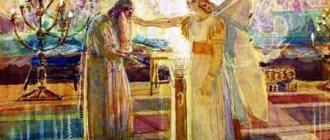Chapter Seven
Scripture texts: Gen. 25:5-6, ; 26:1-5, 23-24
God not only needs Abraham, He needs the corporate vessel. He needs the descendants of Abraham, the church, those who will fulfill His plan. The story of Abraham's life includes both his own experiences and the experiences needed by every vessel of God. Abraham was not just an individual, he was the father of those of the faith (Gal. 3:7). Just as he had to go through these experiences, all those who are of faith must go through the same experiences. As we read the life story of Abraham, we must realize that it is not only a description of Abraham's experience upon whom the Lord is working, but it is also a description of the standard by which God works upon all His people. Abraham's experience is God's requirement of every believer. If we do not meet this requirement, we cannot satisfy God's heart, we cannot achieve His purpose.
God wants us to be His vessels for the fulfillment of His own plan; He wants us to participate in His restoration work. Abraham's experience is amazing, and working on it is truly precious. In the beginning he was an ordinary man, but God brought him through many experiences until one day he became shining in Genesis 22. Here comes a question. Why is it that some of us still do not shine even though we have been Christians for many years? If Abraham is the standard of God's people, how can we reach that standard? How can we let God accomplish in us what He accomplished in Abraham? In Abraham God found a vessel. Will He find a vessel in us? This is the question that faces us.
The Bible says that God is called not only the God of Abraham, but also the God of Isaac. After this He also becomes the God of Jacob. As far as God's purpose was concerned, Abraham was sufficient. But as far as God's work is concerned, it was not enough. God needed Isaac and Jacob before there was completion. This is a very important principle of the Bible. In order for God to gain a person, that person must know God as the Father, just as Abraham knew Him as the Father. He must be delivered from the works of the flesh just as Abraham was delivered from them. He must also know God as the God of Isaac and the God of Jacob. A man must know the God of Isaac and the God of Jacob before he can gain what Abraham gained. God's plan was entirely based on Abraham, and everything that was given to Isaac had already been given to Abraham. Isaac did not surpass Abraham, and Jacob did not go further than Abraham. If Abraham touched the peak, then why couldn’t he immediately inherit the kingdom? He couldn't because there was still a need for additional experiences. There was still a need for Isaac and Jacob to be added to Abraham before God could gain what He intended to gain in Abraham. In other words, we require the experiences of Abraham, and we also require the experiences of Isaac and Jacob. Abraham is our standard. But between Abraham and the people of Israel there were also Isaac and Jacob. God could not “leap over” Isaac and Jacob and go to the people of Israel. Before there could be a nation of Israel and a corporate experience, there had to be an experience of the God that Isaac knew and the God that Jacob knew. God needs a corporate vessel. To become a corporate vessel, one must know God as the God of Abraham, the God of Isaac, and the God of Jacob. We must not forget what God said: “I am... the God of Abraham, the God of Isaac, and the God of Jacob” (Ex. 3:6). Once God began to be called the God of Abraham, the God of Isaac, and the God of Jacob, the people of Israel appeared. This is revealed in the Book of Exodus. Once this is achieved, God obtains His corporate vessel. Now let's look at what the God of Isaac is.
Isaac is like a son
We have seen what the God of Abraham means. Abraham himself was a father. On the one hand, God was leading him to understand that He, God, is the Father. On the other hand, He made Abraham a father. Abraham's original name was Abram, which means "father." Later he was called Abraham, which also means “father,” but in a superlative form, namely: father of many nations. Abraham came to know God as Father and as a result became a father himself. He was a father in every sense of the word. As far as God's work of restoration is concerned, Abraham was the initiator and therefore the father. Regarding God's election, he was the first to be chosen as a representative of God's people and therefore also a father. As for his actions, he was the first to cross the river, and therefore also a father. Who among all mankind was a Jew for all two thousand years after Adam? Whom did God call to leave his country, his household, his father's house and go to Canaan? Abraham was the first. Have we heard of anyone who communicated with God and who was so close to God that He was called a friend of God? Abraham was the first. Have we heard of anyone who gave birth to a son when he could no longer bear children? Abraham was the first. Have we heard of anyone who gave birth to a son at the age of one hundred and then sacrificed him? Abraham was the first. We see in the Bible that Abraham was first in many ways. Indeed, Abraham is the father.
Having seen that Abraham is the father, we will go further and see that Isaac is the son. No one's life story describes the Lord Jesus as the Son more than the life story of Isaac. The birth of Isaac was not according to the flesh, but according to the promise of God. The first two chapters of Matthew in the New Testament correspond to the Book of Genesis in the Old Testament. In the New Testament there was only one person who was not born according to the flesh, and in the Old Testament there was only one person who was not born according to the flesh. The Lord Jesus was not only born according to the flesh, He was the only begotten Son, the Beloved of the Father. He was laid upon the altar and received back from the altar as one raised from the dead (Heb. 11:19). He is the Son whom God loves and who died and rose again. His Father also sent a servant into His own country and to His household to find Him a wife. Those who study the Bible carefully know that it is the Holy Spirit who seeks the church for Christ. The church is in accordance with the Lord's will, it is born of God and belongs to the same family as the Lord Jesus. Isaac and Rebekah belonged to the same family. God's children, the church, were born of God just as the Lord Jesus was born of God.
Abraham once left Canaan and went to Egypt, and Jacob spent his entire old age in Egypt. But Isaac was born in Canaan and died in Canaan, he never left Canaan. This is the Son born in Canaan, raised in Canaan, and died in Canaan. The Son is “the Son of Man who came down from heaven and is in heaven” (John 3:13). He is “the only begotten Son, who is in the bosom of the Father” (1:18). When He was on earth, He expressed the Father, but He never left the bosom of the Father. Therefore, in the system of types, Isaac is the best type of the Son.
As follows from the system of types, Isaac is indeed a type of the Son. But what experiences did Isaac have? We can say that all of Isaac's experiences were quite ordinary. Unlike Abraham, who did many things that no one had ever done before, Isaac did only what others had done before him. Abraham was a real father and Isaac was a real son. Genesis 21 says that Ishmael laughed the day Isaac was weaned, but we don't read anything about what Isaac did as a young man. When Abraham laid the wood for the burnt offering on him, he did not say a word. When Abraham tied him up and laid him on the altar, on the wood, he also said nothing. He silently walked where his father told him. At such a critical moment, he only said: “Where is the lamb for the burnt offering?” (22:7). Genesis 23 says his mother died, and in chapter twenty-four his father found a wife for him. He didn’t make any decisions and didn’t do anything for himself. He had nothing of his own. When he was sixty, he had two sons, which was not unusual because Abraham also had two sons. God told Abraham to cast out his first son and place his second on the altar, but He did not give such commands to Isaac. God loved Jacob and hated Esau (Mal. 1:2-3), but He did not ask Isaac to do anything. Abraham experienced a famine in Canaan, and Isaac experienced a famine in Canaan (Gen. 12:10; 26:1). When the famine came, Abraham went to Egypt. When he was there, he told everyone that his wife was his sister. Finally, Pharaoh rebuked him (12:18-19). Isaac did not go to Egypt during the famine, but he went to Gerar. He also said that his wife is his sister. He was eventually rebuked by Abimelech (26:9-10). Later, Isaac dug several wells, but these were wells that his father had dug. After his father died, the Philistines filled up the wells, and Isaac dug them again. He named them the same as his father had named them (v. 18). When he died, he was buried in his father's grave. Even his grave was prepared for him by his father (49:30-31). This is the story of Isaac's life.
We must learn a lesson from these experiences. We must know God as the Son. We must know God not only as the Father, but also as Christ the Son. What is the significance of God as Son? The fact is that He received everything and did not initiate anything. In Abraham we see God's purpose. In Isaac we see God's power. In Abraham we see the standard that God requires of His people. In Isaac we see a life that enables God's people to reach this standard. The main problem of many Christians is that they see only God's plan, but do not see God's provision. They see God's requirements, but they do not see the power to meet those requirements. This is why we must consider Isaac along with Abraham.
Quotes
- ^ a b
Genesis 17:15–19 18:10–15 - ^ a b c
deClaise-Walford 2000, paragraph 647. - ^ a b c d f Encyclopedia of Religion
,
Isaac
. - Singer Isidore; Broide, Isaac (1901–1906). "Isaac". In Singer Isidore; Adler, Kir; and others. (ed.). Jewish Encyclopedia
. New York: Funk & Wagnalls. - Hirsch, Emil G.; Bacher, Wilhelm; Lauterbach, Jacob Zallel; Jacobs, Joseph; Montgomery, Mary W. (1901–1906). "Sarah (Sarah)." In Singer Isidore; Adler, Kir; and others. (ed.). Jewish Encyclopedia
. New York: Funk & Wagnalls. - Genesis 18:10–12
- Genesis 16:15
- Genesis 21:1–5
- Genesis 21:8–12
- Genesis 25:26
- Genesis 25:20–28
- Encyclopedia of Jewish Studies
, Volume 10, page 34. - Genesis 25:11
- Genesis 26
- Jewish Encyclopedia
,
Isaac
. - Genesis 35:28–29
- Genesis 20:12: Sarah was Abraham's half-sister.
- Genesis 22:21-22: Uz, Buz, Kemuel, Chesed, Hazo, Pildash and Jidlaf.
- ^ a b c d f The New Encyclopedia of Judaism
,
Isaac
. - Encyclopædia Britannica
,
Isaac
. - ^ a b
Brock, Sebastian P.,
New Paulie Brill
,
Isaac
. - Genesis 24:63
- Genesis 26:2
- ^ a b
Easton, M. G.,
The Visual Bible Dictionary
, 3rd ed.,
Isaac
. - Cross and Livingstone, Oxford Dictionary of the Christian Church
, 1974, art
Isaac - Kelly, J. N. D. Early Christian Doctrines
, A&C Black, 1965. p. 72 - Patriarchs, prophets and some other figures of the Old Testament have been and always will be venerated as saints in all liturgical traditions of the Church.
— Catechism of the Catholic Church 61 - "Sunday of the Fathers - Orthodox Wiki."
- Liturgy > Liturgical Year > Advent - Byzantine Catholic Archdiocese of Pittsburgh
- Galatians 4:21–31
- James 2:21–24
- Encyclopedia of Christianity
, Bowden, John, ed.,
Isaac
. - Hebrews 11:17–20
- see FF Bruce, Hebrews
Marshall. Morgan and Scott, 1964, pp. 308–133 for this entire paragraph. - Watt, W. Montgomery. "Isaac". Encyclopedia of Islam
. Brill. - Glass, K. (1991). "Isaac". Concise Encyclopedia of Islam
. HarperSanFrancisco. item 472. ISBN 9780060631260. - Koran 21:72
- Koran 37:112
- ^ a b c d f f Fahlbusch
, Erwin;
Lochman, Jan Milic; Bromiley, Geoffrey William; Barrett, David B.; Mbithi, John (2005). "Isaac". Encyclopedia of Christianity
. Eerdmans. item 744. ISBN 9780802824165. - "Isaac". Columbia Encyclopedia
(6th ed.). Columbia University Press. 1935. P. 3, 200. - Lambie, Joseph Rawson (1893). Chilton, Bruce; Key, Howard Clark; Meyers, Eric M.; Rogerson, John; Levine, Amy-Jill; Saldarini, Anthony J. (Ed.). The Cambridge Companion to the Bible: Contains structure, growth and …
Cambridge University Press. n.. Doi:10.1017/CBO9781139167376. ISBN 9781139167376. - ^ a b
Smith, Alison Moore (1922).
"Iconography of the Sacrifice of Isaac in Early Christian Art." American Journal of Archaeology
.
26
(2): 159–73. Doi:10.2307/497708. JSTOR 497708.
Isaac's relationship with Abraham
Genesis 24:36 says, “Sarah my master’s wife, when she was old, bare my master a son, to whom he gave all that he had.” This son was Isaac. Isaac means that we do nothing ourselves and do not seek anything for ourselves. Isaac is the enjoyment of all that Abraham has. Everything comes from the father. “He gave him everything he had.”
Read verse 25:5 again - “And Abraham gave all that he had to Isaac.” Isaac gained nothing through his own efforts. His prosperity was in no way dependent on himself, it was from God. The Bible shows us that Isaac only had to inherit. Everything he possessed came to him from his father. He didn't have to do anything. His father came to Canaan, and Isaac was born in Canaan. He didn't have to worry about anything.
Isaac's Relationship with God
Isaac's relationship with Abraham was one of acceptance. What was Isaac's relationship with God? Genesis 26:2-3 says, “The Lord appeared to him and said, “Do not go into Egypt; live in the land that I will tell you about. Travel through this land; and I will be with you and bless you; For to you and to your descendants I will give all these lands...” If we had stopped here, we might have thought that God had established a direct relationship with Isaac and made a covenant with him. But as God continues, he clearly says, “…and I will fulfill the oath that I swore to Abraham your father.” God blessed Isaac not on his own, but because of his father Abraham. God's oath was given to Isaac's father. Now God blesses Isaac to confirm the covenant. Verse 4 says, “I will multiply your descendants like the stars of heaven; and I will give to your descendants all these lands; Through your seed all the nations of the earth will be blessed.” God spoke these words to Abraham (22:17-18). He did not give Isaac anything new. He gave Isaac what he had previously given Abraham. How could all the nations of the earth be blessed? Genesis 26:5 says, “Because Abraham...”; this happened not because of Isaac, but because of Abraham. God says that He is first the God of Abraham, and only then the God of Isaac. Genesis 26:24 says, “And the Lord appeared to him that night and said, “I am the God of Abraham your father.” This is the relationship between God and Isaac. Then, God said, “Fear not, for I am with you; and I will bless you and multiply your descendants for the sake of Abraham my servant.” God's Word clearly shows us that Isaac's relationship with God was based on Abraham's relationship with God. God blessed Isaac because he was the son of Abraham. God was the God of Abraham his father. Therefore He blessed Isaac.
Content
- 1 Etymology
- 2 Genesis account 2.1 Birth
- 2.2 Binding
- 2.3 Family life
- 2.4 Migration
- 2.5 Birthright
- 2.6 Family tree
- 5.1 New Testament
- 6.1 Quran
Isaac accepts everything
Based on these two types of relationships, we can see the distinctive characteristics of Isaac. Throughout his life he only enjoyed and accepted. What does it mean to know the God of Isaac? To know the God of Isaac means only one thing: to know God as the One who supplies, and to know that everything comes from Him. If we want to know the Father, we need to know the Son. In order to know the God of Abraham, we need to know the God of Isaac. If we know only the God of Abraham, then we are helpless, because the God of Abraham dwells in unapproachable light (1 Tim. 6:16). But praise the Lord that He is also the God of Isaac. This means that everything that Abraham had belonged to Isaac. This also means that we will have everything if we accept.
If a Christian does not know the God of Isaac, he will get no further. If a Christian does not know who Isaac is, he will not be able to achieve God's purpose. In other words, if we don't know how to receive, we will never achieve God's purpose. Those who do not know Isaac can only live under Mount Sinai. Those who do not know Isaac in life and do not express Isaac in life have nothing but the law. When God makes a demand, they try to fulfill the demand themselves. When God wants something, they try to offer it on their own behalf. This is not Isaac. Such a Christian will ultimately only sigh and say: “For I know that nothing good lives in me, that is, in my flesh; because the desire for good is in me, but I do not find it to do it” (Rom. 7:18). The man spoken of in Romans 7 wanted to be good, he really wanted to be good. But he did the work himself; he did not see that God should deliver him from this. He did not see that everything is in Christ, he did not see the riches prepared by God in Christ. He saw no heritage in Isaac. He didn't understand that the secret to winning is acceptance. He didn't understand that Christians are Christians because of who they are, they don't act out the Christian life. He did not see that God saves man from everything by giving him the law of life. Consequently, he can only exercise his will.
Recommendations
- Browning, W. R. F. (1996). Dictionary of the Bible
. Oxford University Press. ISBN 978-0-19-211691-8. - Paul Lagasse; Laura Goldman; Archie Hobson; Susan R. Norton, ed. (2000). Columbia Encyclopedia
(6th ed.). Gale Group. ISBN 978-1-59339-236-9. Missing or empty | title = (help) - P.J. Birman; Thurs. Bianchis; K.E. Bosworth; E. van Donzel; W. P. Heinrichs (ed.). Encyclopedia of Islam Online
. Brill Academic Publishers. ISSN 1573-3912. Missing or empty | title = (help) - Erwin Fahlbusch; William Geoffrey Bromiley, ed. (2001). Encyclopedia of Christianity
(1st ed.). Publishing company Eerdmans and Brill. ISBN 978-0-8028-2414-1 https://archive.org/details/encyclopediaofch0001unse_t6f2. Missing or empty | title = (help) - John Bowden, ed. (2005). Encyclopedia of Christianity
(1st ed.). Oxford University Press. ISBN 978-0-19-522393-4. Missing or empty | title = (help) - New Encyclopedia Britannica
. Encyclopedia Britannica, Inc.; Rev Ed. 2005 ISBN 978-1-59339-236-9. Missing or empty | title = (help) - Jane Dammen McAuliffe, ed. (2005). "Encyclopedia of the Koran". Encyclopedia of the Quran
. Brill Academic Publishers. ISBN 978-90-04-12356-4. - Jeffrey Vigoder, ed. (2002). "The New Encyclopedia of Judaism ONLY THE CREDO IS FOR SALE." The New Encyclopedia of Judaism
(2nd ed.). New York University Press. ISBN 978-0-8147-9388-6. - Lindsey Jones, ed. (2005). Encyclopedia of Religion
(2nd ed.). MacMillan References. ISBN 978-0-02-865733-2 https://archive.org/details/encyclopediaofre0000unse_v8f2. Missing or empty | title = (help) - DeCleuse-Walford, Nancy (2000). "Isaac". In David Noel Friedman; Allen S. Myers; Astrid B. Beck (ed.). Erdman Bible Dictionary
. Wm. B. Eerdmans. ISBN 978-0-8028-2400-4 .CS1 maint: ref=harv (communication)
Gain, not achievement
The problem with God's children is that they recognize God's demands on Abraham, but they do not see how to meet those demands. After seeing God's goal, God's children think that they should do something to achieve that goal. They do not understand that the Christian life, the conquering life of freedom and sanctification, is acquired, not achieved. Isaac's principle is that everything must be accepted. Salvation is what the Lord Jesus accomplished. Once we have accepted this salvation, we are saved. Salvation is not a race. To get it, you don’t have to climb the heavenly ladder, not being sure of anything until you reach the last step. Salvation is not found in heaven. Quite the contrary, God sends it to us from heaven. The same is true for winning. We don't have to struggle to win day after day. We do not overcome our sins through an extremely strong will. Victory is achieved in the same way as salvation. You don't need to do anything yourself. We just need to accept. When we see and accept, we can say, “Lord, I thank and praise You, because in Christ I have accepted all things!”
Second Peter 1:4 is a precious verse: “By which are given to us exceedingly great and precious promises, that through them you might be partakers of the divine nature, having escaped the corruption that is in the world through lust.” We don't know how many Christians noticed the word "withdrawn." How wonderful this word is! Many Christians say, “I want to leave.” But God says: “having withdrawn.” He does not ask us to leave, and He does not say that He will work until we leave. He says: “withdrawn”! “Having retired” means having already retired. All we need is acceptance. That's what Isaac means.
The meaning of Isaac is that God does the work and we accept the work. We do not thirst, we do not seek, we do not hope again and again. No, we sit down and reap the fruit. We don't have to worry about anything because we are sons and we are no longer "outside" but "inside." Since we are sons, we are also heirs and can inherit family property. Because we are Isaac, we can enjoy. This is all the grace of God.
Work and enjoy
But what do many Christians do? They try to force themselves to do what they cannot do. There are things they don't want to do, but they understand that God wants them to do them, so they try their best to force themselves to do them. Or they want to do something but know God doesn't want them to do it. And so they force themselves not to do it. They are Christians by their actions! This is completely wrong. This is not Isaac, because there is no pleasure in it.
Everything must be done only through the life that God has given us in Christ. This life itself does what God wants from us, it does not force us to do anything. At the same time, this life turns away from what God does not want from us. Therefore, we ourselves do not need to force ourselves to turn away from such and such. We will turn away from all this involuntarily. Whether we do something or not, everything is involuntary. You don't need to force yourself to do anything. That's what Isaac is. God has a supply, and we must come to that supply. This is what it means to be Isaac. When Abraham was about to offer Isaac as a sacrifice to God, Isaac asked only one question: “Where is the lamb for the burnt offering?” This was his one and only question. His father answered: “God will provide for Himself a lamb.” This is what distinguishes Isaac: he enjoys God's provision.
Etymology
The anglicized name Isaac is a transliteration of the Hebrew term Yiṣḥāq
(יִצְחָק), which literally means "He laughs/will laugh."
Ugaritic texts from the 13th century BC. refer to the benevolent smile of the Canaanite deity El.[3] Genesis, however, attributes laughter to Isaac's parents, Abraham and Sarah, not El. According to the biblical account, Abraham fell on his face and laughed when God (Hebrew, Elohim
) broke the news of the possible birth of a son. He laughed because Sarah was past childbearing age; both she and Abraham were advanced in age. Later, when Sarah heard the three messengers of the Lord renewing the promise, she laughed inwardly for the same reason. Sarah denied laughing when God asked Abraham about it.[1][4][5]
Amos spells Isaac not with צ, but with ש - Amos 7:9 ישחק.







